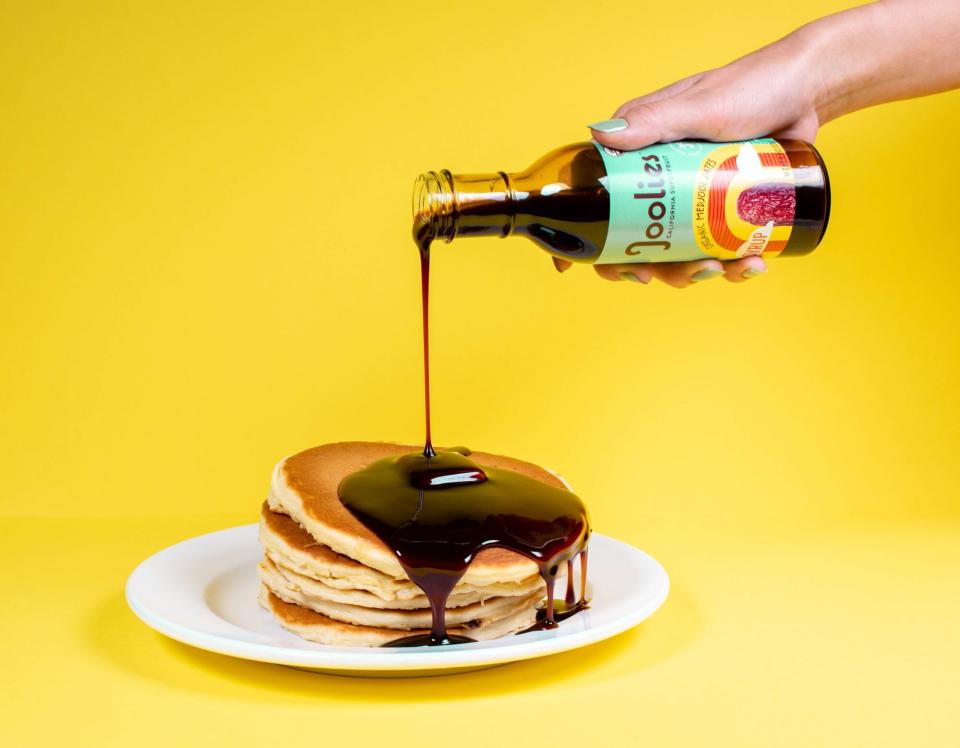All About Date Syrup, an All-Natural Liquid Sweetener
Dotdash Meredith and Yahoo Inc. may earn commission or revenue on some items through the links below.

Courtesy of Joolies
An essential pantry item throughout Israel, the Middle East, North Africa, and other points on the globe, date syrup, a natural vegan liquid sweetener, is gradually winning over fans closer to home—and for good reason. How does it compare to other sweeteners for nutrients and for ease of use, and—perhaps more importantly—how does it taste?
For one thing, it's a nutritious alternative to white sugar, with sweet tooth appeal, so it squares perfectly with a wellness mindset. While there are hundreds of date varieties, the fruit of date palm trees, date syrup is usually made with the most popular types: Medjool or Deglet Nour. It's packed with nutrients including magnesium, potassium, phosphorus, manganese, and iron, plus vitamins A, B, C, and D. It also has a lower glycemic index rating than other natural sweeteners like maple syrup, honey, and agave nectar, and it contains more fiber, which means date syrup has less of a spiking effect on blood sugar levels. Texture-wise, it's smooth with a viscosity that falls somewhere in between maple syrup and honey. And let's not forget its flavor (as if we could). With its rich, complex, caramel-like taste, date syrup is far too delicious to be overlooked any longer.
Related: Everything You Need to Know About Honey
A Favorite Around the World
There are seemingly as many names for date syrup as there are uses. Its more familiar culinary doppelgängers include date honey, date molasses, and date nectar. It's also referred to as dibs in Arabic, silan in Hebrew, and mélasse de dattes, miel de dattes, or confiture de dattes in French. And in Libyan kitchens, it's called rub al-tamr. "Silan is a staple in Iraqi and Iranian cuisine, typically eaten with tahini for breakfast or a snack. Many describe it as a more sophisticated version of peanut butter and jelly!" says Amy Zitelman, CEO of Soom Foods and co-author of The Tahini Table: Go Beyond Hummus with 100 Recipes for Every Meal ($29, amazon.com). Zitelman co-founded the Philadelphia-based Soom with her sisters, Jackie and Shelby, gaining a reputation among chefs for their specialty products, tahini and silan, made in Israel.
Soom Silan ($18.49 for two, amazon.com) uses only steamed and pressed dates (no extra sugar or water) sourced from Israel, 99 percent of which are grown in the Jordan Valley and Arava Desert, boasting some of the country's hottest climates. The silan is produced by first making a date juice, straining it with a cloth, and putting it through a special system to steam the water so it evaporates, retaining the fruit's nutrients.
California is also date country, particularly Coachella Valley, where date palm offshoots were first imported in the early 20th century from the Middle East. A few California-based syrups to try include Joolies Organic Medjool Date Syrup ($21.99 for two, amazon.com), which also comes flavored with cocoa, blueberry, or cinnamon; organic Just Date Syrup ($14.99 for two, amazon.com); and D'Vash Organics Date Syrup ($14.99 for two, amazon.com) which also brings the heat with its Cayenne Date Nectar ($6.99, amazon.com).
Date Syrup Through the Ages
No new kid on the block, date syrup's origins are truly biblical. Dates have been eaten in the Middle East for about 6,000 years, plus they're part of the pantheon of seven agricultural species native to Israel and described in the Hebrew Bible (along with wheat, barley, grapes, olives, figs, and pomegranates).
"Israel is affectionately referred to as the 'land of milk and honey' in the Old Testament, and many scholars ascribe the translation to date honey rather than bee honey," says Zitelman. On Rosh Hashanah, the Jewish New Year, Sephardic and Mizrahi Jews may substitute date syrup for honey in the ritualistic dipping of the apple, representing wishes and hopes for a sweet year. And it may also replace key ingredients in one of the traditional foods on the Passover seder plate. "Iraqi charoset for Passover is made with dates and silan, the recipe existing for thousands of years before the Ashkenazi tradition of apples," says Zitelman.
The Quran also makes numerous references to the date palm, more than any other fruit-bearing plant. The prophet Mohammad considered dates a fruit from paradise, and throughout the Arab world, Muslims break their daily fast during the holy month of Ramadan with a date.
A Must-Use Ingredient for Every Meal
But date syrup isn't just a holiday treat. Its everyday uses are infinite. Consider drizzling it over a bowl of ice cream, oatmeal, yogurt, French toast, pancakes, or even savory bites, like a grilled cheese sandwich. If you're making a batch of homemade granola, sub date syrup for light brown sugar or honey. Pecan pie? Swap the corn syrup for date. You can also use it instead of an egg wash on challah and homemade breads. Mixed with olive oil, silan works its caramelization magic on oven-roasted vegetables and livens up salmon and chicken. And remember silan's pb&j–like affinity for tahini? Try slathering both on toast or pair them with apple cider vinegar and olive oil for a tasty vinaigrette.
Oh, and by the way, date syrup also adds a hint of sweetness to bourbon-based cocktails. But why stop there?

